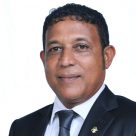
Mohamed Aslam
Minister of National Planning and Infrastructure
Urbanism / Maldives
“Domestic maritime transport is key for the development of this nation”
Facing over-concentration of people in the capital city of Malé and a major infrastructural gap between the main urban centers and smaller communities, the new ministry of national planning and infrastructure has the monumental task of drafting the path for sustainable decentralization. At the center of the solution, as always in the Maldives, lies the ocean.
What has led to the congestion problem that Malé faces today?
Today, over 40 percent of the population lives in the capital Malé, but that was not always the case. It was the centralization of infrastructural development in this region that attracted people to the area in levels that have become unsustainable. Some estimates indicate that by 2050, 65 percent of all Maldivians will live in the Greater Malé region, including Villingili, Hulhumale and Malé. Traditionally, Maldivian atolls have been quite autonomous, but nowadays their economy and livelihoods have become completely dependent on the capital. For instance, when the British still maintained a military base in Addu City, people from Malé would go there to seek medical treatment or education. The quality of life was quite high. Today, the focus has shifted completely to Malé, which caused a progressive rural exodus towards the capital. This is the biggest challenge we have; to slow down and reverse this flow.
How do you plan to reverse this trend?
We are working on a plan that will address these issues and develop the nation as a whole. There has been investment in regional airports and other types of infrastructure across the nation, but it always lacked integrated planning. Previous administrations have followed a rationale defined by the fact that we cannot have hospitals, schools and urban centers in all of the 194 islands in the country, and so people need to be brought together. I disagree with this approach. People should have the ability to live where they want, and we should find the means to make that possible and sustainable. We are establishing a model where we develop the country organically, where each island, urban center or village works like a cell within a network.
How can services be available to everyone without centralizing communities?
The answer for that is mobility. Domestic maritime transport is the key for the development of this nation. We have never had an actual public transport system in the Maldives. Today, the only national transport system that works in an organized way with a set schedule is air transportation, which is far too expensive for the vast majority of Maldivians. In other countries, people have alternatives, cars, trains, buses. Here, we have vessels. It is true that boats are more expensive to maintain than buses, but we don’t need to invest in roads, or maintain them. Every inhabited island in the Maldives has a harbor, so the infrastructure is there. We need the vessels to operate an organized public transport system that is functional and efficient. At first, we might not have much volume, but as with any public transportation system around the world, once people get used to it, they will not be able to live without it, making it financially sustainable. If communities are well connected, and can access a hospital, a school, a public service center or any other facility through a short, comfortable and efficient boat trip, they will have no need to move to a main urban center. This maritime public transport system will be at the center of the new infrastructure plan we are designing for the future of the nation.
